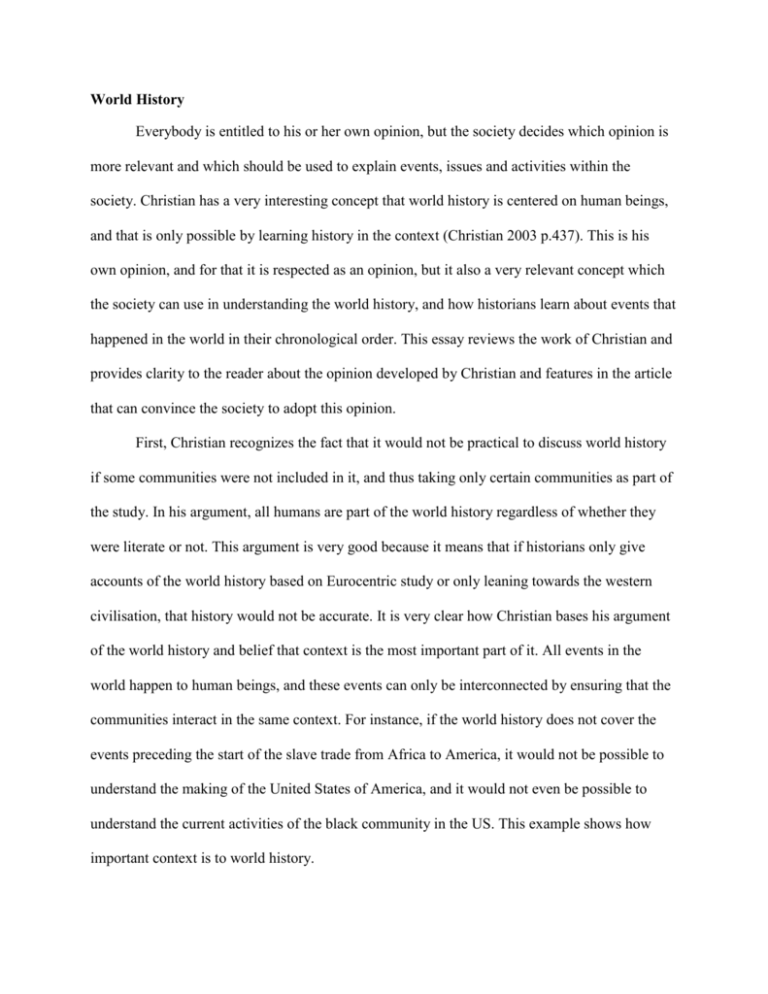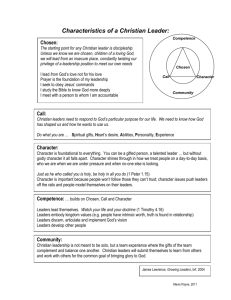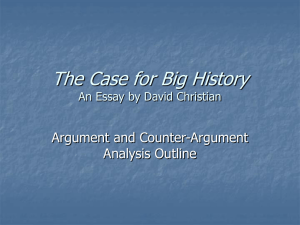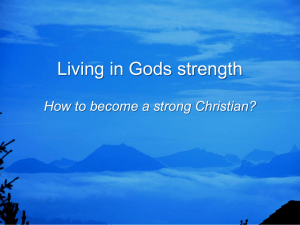World History - All Australian Essays
advertisement

World History Everybody is entitled to his or her own opinion, but the society decides which opinion is more relevant and which should be used to explain events, issues and activities within the society. Christian has a very interesting concept that world history is centered on human beings, and that is only possible by learning history in the context (Christian 2003 p.437). This is his own opinion, and for that it is respected as an opinion, but it also a very relevant concept which the society can use in understanding the world history, and how historians learn about events that happened in the world in their chronological order. This essay reviews the work of Christian and provides clarity to the reader about the opinion developed by Christian and features in the article that can convince the society to adopt this opinion. First, Christian recognizes the fact that it would not be practical to discuss world history if some communities were not included in it, and thus taking only certain communities as part of the study. In his argument, all humans are part of the world history regardless of whether they were literate or not. This argument is very good because it means that if historians only give accounts of the world history based on Eurocentric study or only leaning towards the western civilisation, that history would not be accurate. It is very clear how Christian bases his argument of the world history and belief that context is the most important part of it. All events in the world happen to human beings, and these events can only be interconnected by ensuring that the communities interact in the same context. For instance, if the world history does not cover the events preceding the start of the slave trade from Africa to America, it would not be possible to understand the making of the United States of America, and it would not even be possible to understand the current activities of the black community in the US. This example shows how important context is to world history. In essence, the argument seems to give the idea that interconnectivity of events to each other would only be possible through context, and it is not possible to understand one event if the context of a prior event is not considered. Christian gives the example of 19th century workers movement and the Industrial revolution. He indicated that, without knowledge of the revolution, it would be useless to discuss the movement because they are connected. When taken into context, however, things become very clear. The second idea that Christian explains which show why geographical events or layout should not be used to base world history is because they do not contribute to the exact development of humans in the society. He explains that humans are very good at adapting to their environment, and many other animals also are, and, therefore, this is a suggestion that if animals can adapt to their environment and manage any change in that environment, there must be something better to explain world history. According to Christian, learning process has contributed greatly to world history because humans are able to pass knowledge to their future generations while animals do not have that ability. In short, each generation of animals starts learning to adapt to the environment from scratch while humans have knowledge passed to them by their parents. Andrea and Overfield (2012 p.9) studied the early civilization in Mesopotamia, the present day Iraq, which is credited to be one of the earliest civilizations in the Eurasia and which started as a farming community. Their study follows documents and records collected from the cities in Mesopotamia, and the fact that there were records, even if they were mere drawings, murals and other artefacts collected proves that Christian is right about the learning process as an important adaptation strategy for humans, and hence its importance in defining world history (Bar-Yosef 1988 p.162). Future generations of Sumerians would not have improved their farming techniques or their housing because they would not have understood how their previous generations had done without getting some basic information from these past generations. In short, if the transfer of knowledge and information in humans was as limited as it is in animals, it would not be possible to have the world history as it is known today because there would be no way that human would grow. It is true that all geographical activities such as the ice age and the continental drift would have happened, but as long as the context of history is based on humans and their nature, there would not have world history. Fred Spier (2005 p.89) seem to be on the same line of thought with Christian because he thinks that since humans have tapped energy and used it in their revolutions and evolutions, leading to growth and changing the history, the context of the chronology of the human race is very important in determining what the world history is and how it is not only created, but how it should be conducted. If the human race did not have means of tapping power and energy so that it is used for making their work easier, it would mean that no progress would be experienced. History is thus not about the time that has elapsed, but what has happened within the elapsed time. All records and artefacts that are collected by historians and biologists who conduct tests and genetic sequencing have something different from what was notable in a different generation. Some tombs are discovered and the remains in the tombs could show some tools such as stone and bone objects used for cutting, and carbon dating indicates age of the generation. The context of such objects shows humans in the time dictated by the carbon dating results to be hunters and gatherers (Andrea & Overfield 2012 p.10). In the same way, images found on caves in Mesopotamia years later show people farming in rivers, and hence indicates a change. If the two activities are not put into context by historians, they will be giving wrong and contradicting information. The best way is to state that, at a certain period, humans across the globe were hunters and gatherers, but the agrarian revolution converted some into farmers and with industrialisation, many other forms of living and livelihood were established. Christian has planned his article well and has offered good examples to support his arguments. Furthermore, he has given his reasons to show that the scale of history should not be limited to certain locations, but should be discussed as an entire human race because basing the study of world history on one civilization does not give a proper account of the history (Christian 2003 p.442). If the slave trade is discussed, it cannot be focused on how slaves were sold in slave markets in North America and Europe alone, it should be discussed from the point African and Indian slaves were picked from their homes. It should also be discussed according to factors preceding it such as the building of ships and discovery of navigation routes. Summarily, Christian is a convincing writer. Reference List Andrea, A. J., & Overfield, J. H,2012, Mesopotamia: Myth and Law, In The Human Record: Sources of Global History, Volume 1 to 1500,pp. 7-17, Boston MA: Wadsworth. Bar-Yosef, O. ,1988, The Natufian Culture in the Levant,Threshold to the Origins of Agriculture, Evolutionary Anthropology , 159-477. Callaway, E.,2014, February 13, Ancient genome stirs ethics debate, Nature , pp. 142-143. Christian, D.,2003, World History in Context, Journal of World History 14-4 , 437–52. Spier, F.,2005, How Big History Works: Energy Flows and the Rise and Demise of Complexity, Social Evolution & History 4(1) , 87–135.








